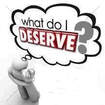“The greatest deception men suffer is their own opinions.”
~Leonardo da Vinci

WHAT IS AN OPINION?
If you look the word up in the dictionary, you will find the definitions along this line, stating that an opinion is:
● A view or judgment formed about something, not necessarily based on fact or knowledge.
● An estimation of the quality or worth of someone or something
● The beliefs or views of a large number/ majority of people about something; a generally held view.
● A belief stronger than impression and less strong than positive knowledge
● A formal expression (as by a judge) of legal principles upon which a legal decision is based.

“Most human beings believe their opinions are facts.” Because they believe it, that makes it so. "Make it sew!"►
“I HAVE A RIGHT TO MY OPINION.”
This is a phrase most people have used at one time or another, and sometimes too often. I doubt that most us have ever thought in depth about what it means.
The statement “I have the right to my opinion” means that “no one can stop me from thinking, observing, and drawing conclusions about anything.”
Having the “right” to either have opinions or stopping people from having them is a moot point. In fact, no one can prevent another person from forming views about the world around them -- short of getting into medical and/or psychological interventions or serious violence.
So, sure. You have the right to your opinion … but keep in mind that “rights” are defined by the duties to which they give rise. When you claim a “right” to something, ask yourself what duties this right is supposed to impose on others.
medium.com/@neallwebster/

Although the phrases are used interchangeably, Entitled means that you have been given a legal right or just claim to receive or do something. However, most dictionary definitions of entitle or entitled imply or flat out state that a person who is entitled believes themselves to be inherently deserving of privileges or special treatment and feel they deserve what they want without earning it and can take it from someone else just because of who they are. Yikes!
Philosophers consider both statements as logical fallacy. “A logical fallacy is an error in reasoning that renders an argument invalid. All logical fallacies are arguments in which a conclusion doesn't follow logically from what preceded it.” https://www.thoughtco.com/what-is-logical-fallacy-1691259
Urbandictionary.com puts it, rather bluntly, this way: “You have the right to your opinion, but at the same time go fuck yourself and the horse you road in on.”

The right to express your opinion is a separate issue. Generally speaking, yes, you do have the right to express your opinion … at this point in time.
Article 19 of the Universal Declaration of Human Rights, adopted in 1948 by the United Nations General Assembly, states that: “Everyone has the right to freedom of opinion and expression; this right includes freedom to hold opinions without interference and to seek, receive and impart information and ideas through any media and regardless of frontiers.” https://www.un.org/en/universal-declaration-human-rights/
However, the exercising of these rights carries "special duties and responsibilities" and may "therefore be subject to certain restrictions" when necessary "[f]or respect of the rights or reputation of others" or "[f]or the protection of national security or of public order (order public), or of public health or morals." https://en.wikipedia.org/wiki/Freedom_of_speech
Although much of the world enjoys a political state of affairs which allows them to speak out without prosecution, that hasn’t always been true and could change in the future. There hasn’t always been a United States or United Nations to grant people freedom of speech.
No matter who or where we are, there are always other human beings who have, and will continue to have, the power and means to prevent most people from stating what they believe, good, bad, or indifferent. Whether or not that power is exercised is a separate matter. This is where the violence comes in. Keep in mind we have fought wars and earned Freedom of Speech.
The second point in this discussion: you do not have the right to expect anyone to listen to your opinion, act on it, or treat it as truth. Also, you do not have an equal right to be heard on a matter in which the other party is the only one with the relevant expertise and facts.
Before you express your opinion, take a moment to remember the following:
● Opinions are not fact; they are expressions of a point of view.
● Opinions are not actions.
● Opinions change frequently and are not binding commitments.
● Opinions are not necessarily rational.
● Opinions are not essential.

Cortney S. Warren, Ph.D. writes, “A fact is a statement that can be supported to be true or false by data or evidence. In contrast, an opinion is a personal expression of a person’s feelings or thoughts that may or may not be based in data. Indeed, many of our opinions are based on emotions, personal history, and values—all of which can be completely unsupported by meaningful evidence.” www.psychologytoday.com/
We tend to protect and defend our opinions because they are an expression of us; our values, self esteem, beliefs, goals, education, identity, and our views on the specific subject. On the surface, opinions give us a voice. People agreeing with our opinions gives us validation. An attack on our opinions is like an attack on our physical person, and the human reaction is to defend yourself with anything you can use.
It never hurts to listen to others and assess their points as well as the significance of the opinion. We need to take a step back and assess the importance of any opinion.

Warren makes sense when he states all opinions are not equally valuable, depending on the manner in which they were formulated. In the hierarchy of Opiniondom, those based on facts, knowledge, and analysis have the highest value because they can be treated by others as serious candidates for the truth. That still doesn’t make them true, but those informed opinions are a step toward finding the truth – and they are much easier to defend.
The lowest order of opinion is the gut-reaction; a view based on personal experience with nothing else to back it up. As Bill Bullard, lawyer and former member of the Michigan State legislature, says, “Opinion is really the lowest form of human knowledge. It requires no accountability and no understanding.”
The second face of this pyramid is the significance of the subject matter. You could have all the data and facts in the world that prove you look better in a long red dress rather than in a short black dress, but it’s an issue that only matters to you and maybe to your mother and your dressmaker. Essentially trivial and inconsequential on a larger scale, although not to you within your sphere of activity.
The third face of the discussion focuses on who has the opinion and who will listen to it. Obviously human beings formulate opinions about nearly everything. Sometimes it’s just the way of nature. Other times people formulate opinion with purposeful intent, which usually implies influencing some kind of future action, whether it be the selection of healthy food in the grocery store or advising the Commander in Chief about declaring war.
The people who opinions are valuable arrive at their conclusions because they have expertise and facts and have looked at all sides of the issues. Their opinions will carry weight with decision makers because of that. Mediawatch host Jonathan Holmes says, “there’s evidence, and there’s bulldust,.and it’s not part of a reporter’s job to give bulldust equal time with serious expertise.” http://theconversation.com/no-youre-not-entitled-to-your-opinion-9978

First and foremost, the reality is our opinions only matter when we are in a position to affect change. The rest is pretty much useless mental and emotional clutter.
The reason people continue to use this phrase, although it is meaningless, reveals a great deal about the individual making the statement. According to most of my research, people speak these phrases in order to close down and walk away from a disagreement and/or to discredit or manipulate someone. The phrases are used as a way to:
● To end the debate when it is a waste of time and effort to continue because the issue cannot be resolved at that moment, at that location, or by the people engaged.
● To silence others who have different opinions and not let them have their say. To silence opinions you do not want to hear.
● To “save face” by defusing an argument or disagreement and presenting the opportunity for both parties to walk away; agreeing to disagree is a “No Harm” solution most of the time.
● To offer an excuse for not believing the truth or the facts.
● To finish the argument when the speaker has: 1) hit the wall defending their position; 2) knows or suspects they are incorrect, 3) has no evidence to back up the opinion. It is the last ditch effort to justify an indefensible point of view by defending their right to hold an opinion, no matter how stupid, ignorant or ill-founded it may be.
● To prevent yelling, a fight, or serious consequences from the disagreement.
● To discredit one or more participants in opposition by implying the opposition is of no value and it’s not worth the time to even talk to them.
● To demonstrate to others that the opposition is less smart or less knowledgeable by tearing them down or refusing to budge; It’s giving the opposition the brushoff as being unworthy of listening to.
● To justify the speaker’s belief that he/she can say of think whatever they like and implying that continuing to disagree with them is disrespectful.
● To cover up the speaker’s ignorance in order to protect their misconstrued beliefs.
● To have the satisfaction of getting in the last word.

Nothing we or others can do will stop our brains from formulating opinions or developing personal preferences, but there are things we can do.
● Give up the belief that you need an opinion on everything. Save your angst and energy for those things that are important and you can actually do something about. That’s not just an excuse to be lazy or apathetic about things. Sure, you can’t actually make the decisions on issues before congress, but you can vote for the people who do. Don’t undersell the ways in which you can affect actions and decisions.
● If an issue falls into the “important” category and is worth your time to have an opinion, it is also worth your time to inform yourself of the facts, or at least the pros and cons.
● When you express your opinion, say why you believe that and be able to reasonably argue for it with evidence and real facts. If it’s trivial, don’t bother talking about it.
● Abandon the dismissive phrase “That’s just your opinion” and focus on whether people can offer good reasons for the claims they make – reasons that might compel us to share their views.
Patrick Stokes, noted philosopher, suggests that the “next time you hear someone declare they’re entitled to their opinion, ask them why they think that. Chances are, if nothing else, you’ll end up having a more enjoyable conversation that way.” qz.com/852709/a-philosophy
□
Sources:
https://qz.com/852709/a-philosophy-professor-explains-why-youre-not-entitled-to-your-opinion
https://www.philosophersmag.com/essays/26-the-fact-opinion-distinction
https://strangenotions.com/fact-and-opinion/
http://home.sandiego.edu/~baber/logic/6.Knowledge.pdf
https://philosophy.stackexchange.com/questions/8053/what-is-the-difference-between-fact-and-truth
https://en.wikipedia.org/wiki/I%27m_entitled_to_my_opinion
https://en.wikipedia.org/wiki/Relativist_fallacy
http://theconversation.com/no-youre-not-entitled-to-your-opinion-9978
https://medium.com/@neallwebster/sorry-but-you-are-not-entitled-to-your-opinion-ef4b06b3f094
http://bit.ly/1hC2Atp
http://bit.ly/1EPUB0x
http://bit.ly/1Jf4ngV
https://goo.gl/frzEch
http://bit.ly/1JekZDa
https://www.oxfordscholarship.com/view/10.1093/acprof:oso/9780198252177.001.0001/acprof-9780198252177-chapter-33
https://www.urbandictionary.com/define.php?term=You%20are%20entitled%20to%20your%20opinion
https://www.iep.utm.edu/ep-en/
https://www.psychologytoday.com/us/blog/naked-truth/201706/your-right-opinion-does-not-make-your-opinion-valid
https://www.huffpost.com/entry/stop-letting-other-peoples-opinions-control-you_b_9587330z
https://digest.bps.org.uk/2018/05/31/people-who-think-their-opinions-are-superior-to-others-are-most-prone-to-overestimating-their-relevant-knowledge-and-ignoring-chances-to-learn-more/
https://fs.blog/2017/10/opinions-on-everything/
https://www.huffpost.com/entry/15-important-truths-about_b_5532585
https://www.inc.com/kat-boogaard/6-key-tips-to-respectfully-disagree-with-someone.html
https://www.linkedin.com/pulse/sorry-you-entitled-your-opinion-bruce-d-
http://quantumperformanceinc.com/agreeing-to-disagree-is-always-a-cop-out/
https://www.onewithnow.com/no-opinion/
https://www.someecards.com/usercards/viewcard/tell-me-again-how-you-pay-my-bills-clean-my-house-raise-my-kids-and-live-hereoh-wait-you-dont-so-sit-down-and-keep-your-opinions-to-yourself-thanks-700d7/?tagSlug=mom|
https://www.permaculturevoices.com/agruing-with-reality-and-making-yourself-miserable-with-javan-bernakevitch/
https://www.philosophersmag.com/essays/26-the-fact-opinion-distinction
https://strangenotions.com/fact-and-opinion/
https://philosophy.stackexchange.com/questions/8053/what-is-the-difference-between-fact-and-truth
https://www.inc.com/kat-boogaard/6-key-tips-to-respectfully-disagree-with-someone.html
https://digest.bps.org.uk/2018/05/31/people-who-think-their-opinions-are-superior-to-others-are-most-prone-to-overestimating-their-relevant-knowledge-and-ignoring-chances-to-learn-more/
More Resources:
Whyte, Jamie (2004). "The Right to Your Opinion". Crimes Against Logic.
New York: McGraw-Hill. ISBN 0-07-144643-5.
Deleuze, Gilles (1994). "The Image of Thought". Difference and Repetition. Paul Patton (trans.).
New York: Columbia University Press. ISBN 0-231-08159-6.
Whyte, Jamie (August 9, 2004). "Sorry, but you are not entitled to your opinion".
The Times. News UK. Archived from the original on February 8, 2011.
Stokes, Patrick (9 October 2012). "You're not entitled to your opinion".
New Zealand Herald. Retrieved 7 April 2017.

 RSS Feed
RSS Feed